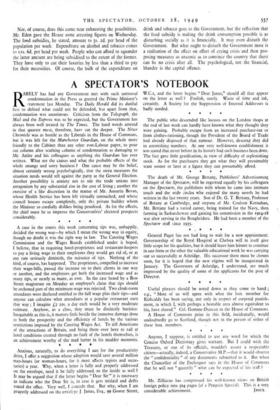A case in the courts this week concerning tips was,
unhappily, decided the wrong way—by which I mean the wrong way in equity, though no doubt it was the right way in law. The Catering Wages Commission and the Wages Boards established under it hoped, I believe, that in requiring hotel-proprietors and restaurant-keepers to pay a living wage to their employees they would get rid of, or at any rate seriously diminish, the nuisance of tips. Nothing of the kind, of course, has happened. The proprietors, compelled to increase their wage-bills, passed the increase on to their clients in one way or another, and the employees get both the increased wage and as many tips, or nearly as many, as ever. In the case heard by a Bow Street magistrate on Monday an employer's claim that tips should be reckoned part of the minimum wage was rejected. Two cloak-room attendants were declared entitled to the full wage plus their tips—and anyone can calculate what attendants at a popular restaurant earn that way ; I imagine £2 los. a day each would be a very moderate estimate. Anyhow, as a class, they must be distinctly burjoice. Inequitable as this is, it matters little beside the immense damage done to both the prosperity and the efficiency of hotels by the various restrictions imposed by the Catering Wages Act. To tell Americans of the attractions of Britain, and bring them over here to rail at hotel conditions created through no fault of the hotels themselves, is an achievement worthy of the mad hatter in his madder moments. * * * *






































 Previous page
Previous page